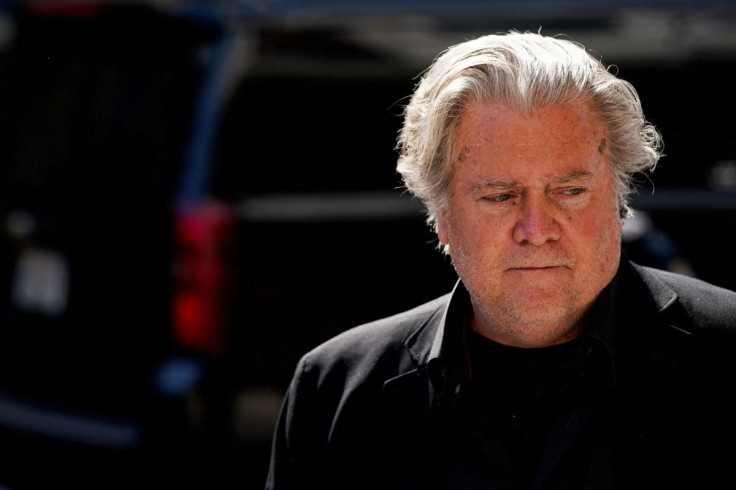Trump Ex-adviser Bannon Spurned Congressional Panel, Witness Says

A senior staff member of the congressional panel probing last year's U.S. Capitol attack testified on Wednesday that Steve Bannon, Donald Trump's prominent former presidential adviser, disregarded deadlines to respond to its subpoena, sought no extensions and offered an invalid rationale for his defiance.
Kristin Amerling's comments came on the second day of testimony in Bannon's trial in federal court. Bannon, 68, has pleaded not guilty to two misdemeanor counts of contempt of Congress for defying the committee's subpoena issued as part of its inquiry into the Jan. 6, 2021, rampage by Trump supporters.
U.S. District Judge Carl Nichols admonished defense attorney Evan Corcoran for interrupting Amerling during his cross-examination after the prosecution completed its questioning. The judge also warned Corcoran earlier in the day without the jury present: "I do not intend for this to become a political case, a political circus."
Amerling, deputy staff director and general counsel of the Democratic-led House of Representatives select committee, was the first witness called by the prosecution, starting on Tuesday and resuming on Wednesday.
Amerling said Bannon missed multiple deadlines in October 2021 to provide documents and testimony under a subpoena issued the prior month and neither sought an extension nor told the committee he had no documents responsive to its request.
That testimony could complicate Bannon's defense. On Tuesday, Corcoran told jurors that Bannon believed the subpoena deadlines were not set in stone and that negotiations between his attorney and the committee would continue.
Corcoran on Wednesday pressed Amerling on what role Bennie Thompson, the panel's Democratic chairman, played in drafting the subpoena and setting its deadlines - an apparent attempt to suggest political motivations.
"What human set that deadline?" Corcoran asked Amerling.
She testified that deadlines were formulated by senior committee staff including her, but that the ultimate decision rested with Thompson, who possessed the legal authority to sign the subpoena.
Amerling said the panel set deadlines requiring an "expeditious response" because it had reason to believe Bannon had relevant information.
Trump's supporters stormed the Capitol and attacked police in a failed effort to block formal congressional certification of his 2020 election loss to Democrat Joe Biden. Amerling said Bannon was identified as one of the people who attended a planning meeting at a Washington hotel the day before the riot. Amerling also noted Bannon's podcast comments in which she said he repeated false claims that the election had been "stolen."
Prosecutor Amanda Vaughn asked Amerling about a letter from Robert Costello, a lawyer representing Bannon, to the committee after a deadline saying Bannon could not comply with the subpoena due to a legal doctrine called executive privilege that can keep certain presidential communications confidential.
"The select committee's position was this was not a valid rationale for refusing to comply," Amerling testified.
Vaughn entered as evidence a letter sent by Thompson stating that Costello's legal position on why Bannon could not comply had "no basis in law."
The judge previously ruled that Bannon could not claim in the trial that he failed to comply because he believed his documents and testimony were protected by executive privilege.
The prosecution showed another Costello letter reiterating that, absent an agreement between the committee and Trump or a court order, Bannon would not comply with the subpoena. The committee subsequently sent Costello a letter saying it believed Bannon had willfully violated the federal law regarding criminal contempt of Congress, and gave Bannon another chance to comply, but he did not.
Presentation of the prosecution's case is not expected to last long. It is not yet clear what witnesses, if any, Bannon's defense team would call. His attorneys have pushed for permission to call Thompson as a witness.
Vaughn earlier in the day told the judge that she was concerned over Corcoran's comments to jurors in his Tuesday opening statement suggesting that the case against Bannon was motivated by political bias. Vaughn accused the defense of trying to circumvent the judge's pre-trial rulings aimed at keeping politics out of the case.
That was when the judge said he did not intend to let the case become a political circus.
© Copyright Thomson Reuters 2024. All rights reserved.





















